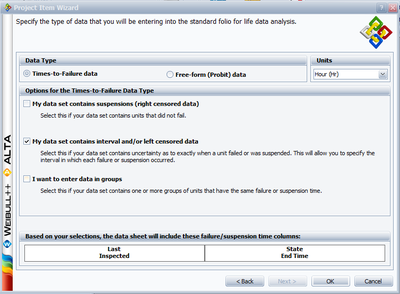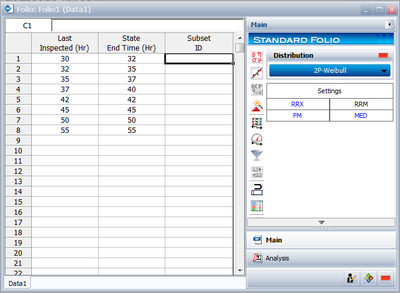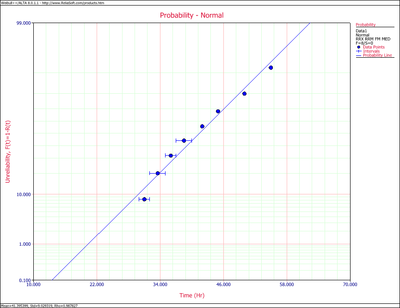Template:Example: Normal General Example Interval Data: Difference between revisions
Jump to navigation
Jump to search
No edit summary |
No edit summary |
||
| Line 6: | Line 6: | ||
{|align="center" border=1 cellspacing=1 | {|align="center" border=1 cellspacing=1 | ||
|- | |- | ||
|colspan="3" style="text-align:center"| Table | |colspan="3" style="text-align:center"| Table - Non-Grouped Data Times-to-Failure with intervals (lnterval and left censored) | ||
|- | |- | ||
!Data point index | !Data point index | ||
Revision as of 23:30, 10 February 2012
Normal Distribution General Example Interval Data
Eight units are being reliability tested and the following is a table of their times-to-failure:
| Table - Non-Grouped Data Times-to-Failure with intervals (lnterval and left censored) | ||
| Data point index | Last Inspected | State End Time |
|---|---|---|
| 1 | 30 | 32 |
| 2 | 32 | 35 |
| 3 | 35 | 37 |
| 4 | 37 | 40 |
| 5 | 42 | 42 |
| 6 | 45 | 45 |
| 7 | 50 | 50 |
| 8 | 55 | 55 |
Solution
This is a sequence of interval times-to-failure. This data set can be entered into Weibull++ by creating a data sheet that can be used to analyze times-to-failure data with interval and left censored data.
[math]\displaystyle{ }[/math]
The computed parameters for maximum likelihood are:
- [math]\displaystyle{ \begin{align} & \widehat{\mu }= & 41.40 \\ & {{{\hat{\sigma }}}_{T}}= & 7.740. \end{align} }[/math]
For rank regression on x:
- [math]\displaystyle{ \begin{align} & \widehat{\mu }= & 41.40 \\ & {{{\hat{\sigma }}}_{T}}= & 9.03. \end{align} }[/math]
For rank regression on y:
- [math]\displaystyle{ \begin{align} & \widehat{\mu }= & 41.39 \\ & {{{\hat{\sigma }}}_{T}}= & 9.25. \end{align} }[/math]
A plot of the MLE solution is shown next.
[math]\displaystyle{ }[/math]


